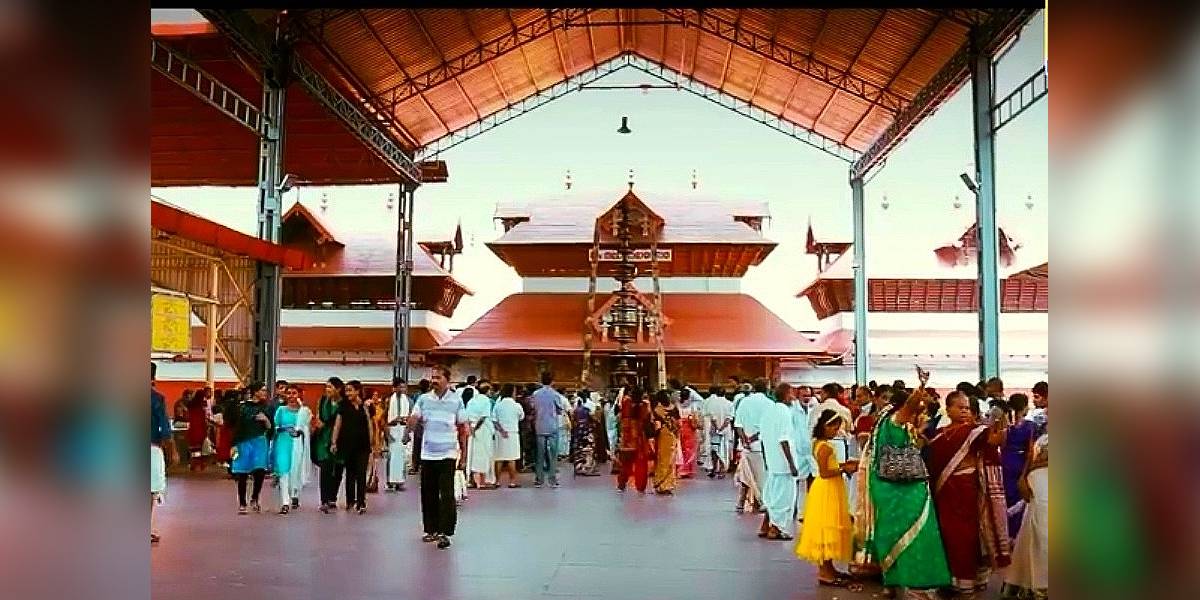A vacancy announced by Guruvayur Devaswom triggered a discussion on the continuation of reservations for Brahmins in temple appointments.

The Sree Krishna Temple at Guruvayur in Thrissur. The temple traditionally does not allow non-Hindus on its premises. (Susmita Nair/Wikimedia Commons)
Many in Kerala will still remember playback singer KJ Yesudas’ soulful rendering of Vayalar Ramavarma’s lines penned for the 1970 movie Thacholi Othenan.
The song reflected the singer’s burning desire to visit the famed Sree Krishna Temple at Guruvayur in the Thrissur district. “Guruvayur ambala nadayil, Orudivasam njaan pokum…” (roughly translated: “I will go to the temple one day”), Yesudas sang in his mellifluous voice.
Many interpreted the song as Yesudas’ desire to visit the temple, known as the Dwaraka of the South.
Even 53 years after he had sung the song, the singer has not been permitted to visit the temple, though he could greet the Lord from outside the temple premises.
The temple does not allow non-Hindus — irrespective of their bhakti (devotion) — to enter its premises.
Though a Christian, Yesudas is a fervent devotee of Lord Krishna and has rendered several popular Hindu devotional songs. There is no bar on playing his songs in temples.
Kerala has achieved many firsts during the past five decades. Yet, non-Hindus are not allowed to worship Guruvayurappan inside his abode.

K Radhakrishnan, Minister for the Welfare of Scheduled Castes, Scheduled Tribes and Backward Classes, Devaswoms & PAD. (Facebook)
One of the state’s much-trumpeted achievements was the recruitment of 36 non-Brahmin priests — including six Dalits — to temples in south Kerala by the Travancore Devaswom Board (TDB) in 2017. The ruling CPI(M) lost no time claiming credit for the revolutionary move.
Despite the state’s proclaimed progressive roots, significant temples in Kerala — such as the forest shrine of Lord Ayyappa at Sabarimala — have traditionally favoured Malayali Brahmins as priests, and the practice continues despite the recruitment of the aforementioned non-Brahmins.
The non-Brahmin priests now serve in some of the most isolated temples in southern Kerala. The government has not initiated any further comparable recruitments.
Kerala’s Devaswom Minister and the CPI(M)’s Dalit face K Radhakrishnan recently said he was discriminated against at a temple in north Kerala where he was to inaugurate an infrastructure project less than two months ago.
Two priests from that temple, the minister claimed, refused to pass over to him the usual lamp they had lit to light the main lamp to mark the inauguration. Instead, they kept it on the floor and moved away.
The minister felt his Dalit identity might have made the priests act in such a manner, and he refused to light the lamp.
Radhakrishnan’s claim kicked up a controversy, and the temple clarified that the priests’ act was based on the tradition that no one should touch and make them impure.
Despite the insult the minister had to face, the Kerala Devaswom Recruitment Board (KDRB) recently issued an advertisement, inviting applications from able-bodied Brahmin youths to be appointed as cooks in the Guruvayur temple.
As soon as the advertisement was published in a few Malayalam newspapers, Dalit organisations labelled it discriminatory and unhelpful to the state government’s declared progressive moorings.
On 11 October, the board published a notification stating that candidates must be able to “read and write Malayalam”, “have good physical fitness”, and have “not less than three years of experience in the relevant field”.
When contacted, KDRB Chairman KB Mohandas justified the notification, asserting that the Guruvayur Devaswom Board’s specific guidelines for appointments allowed only Brahmin youths with no physical disabilities.
Despite repeated attempts, South First could not contact Minister Radhakrishnan, who also heads the Department for SC/ST Welfare.
Incidentally, after the 2017 recruitment of 36 non-Brahmins to various temples under the TDB, the tantri (head priest) of the Guruvayur temple agreed to hiring of non-Brahmins as employees. But no follow-up action was taken.
Orthodoxy in Kerala has a long history of opposing the recruitment of non-Brahmins to temples.
When the TDB, which manages 1,252 temples — including the Sabarimala Sree Dharma Sastha Temple — and employs over 2,500 people, began recruiting priests from backward communities in the 1970s, it invited stiff opposition.
The board subsequently assigned the priests to clerical duties.
However, when it opted to adhere to the quota system requiring 32 percent caste reservation in all appointments in 2017, it was appreciated by raucous acclaim from all quarters.
However, other Devaswom boards, such as Kochi, Guruvayur, and Malabar, are still apprehensive of a caste Hindu backlash and continue with the old recruitment practice of even reserving the position of cook for Brahmins.
”The Guruvayur event demonstrates how caste Hindus are still active, even in temple recruiting boards. They are eager to usurp positions such as driver, cook, and cleaning staff. They show little consideration for inclusivity. If the rules and statutes continue to promote savarna (upper caste) interests, it is high time that we changed them by ushering in inclusiveness,” Dalit philosopher Sunny M Kapikkad said.

Jul 26, 2024

Jul 26, 2024

Jul 25, 2024

Jul 25, 2024

Jul 25, 2024

Jul 24, 2024